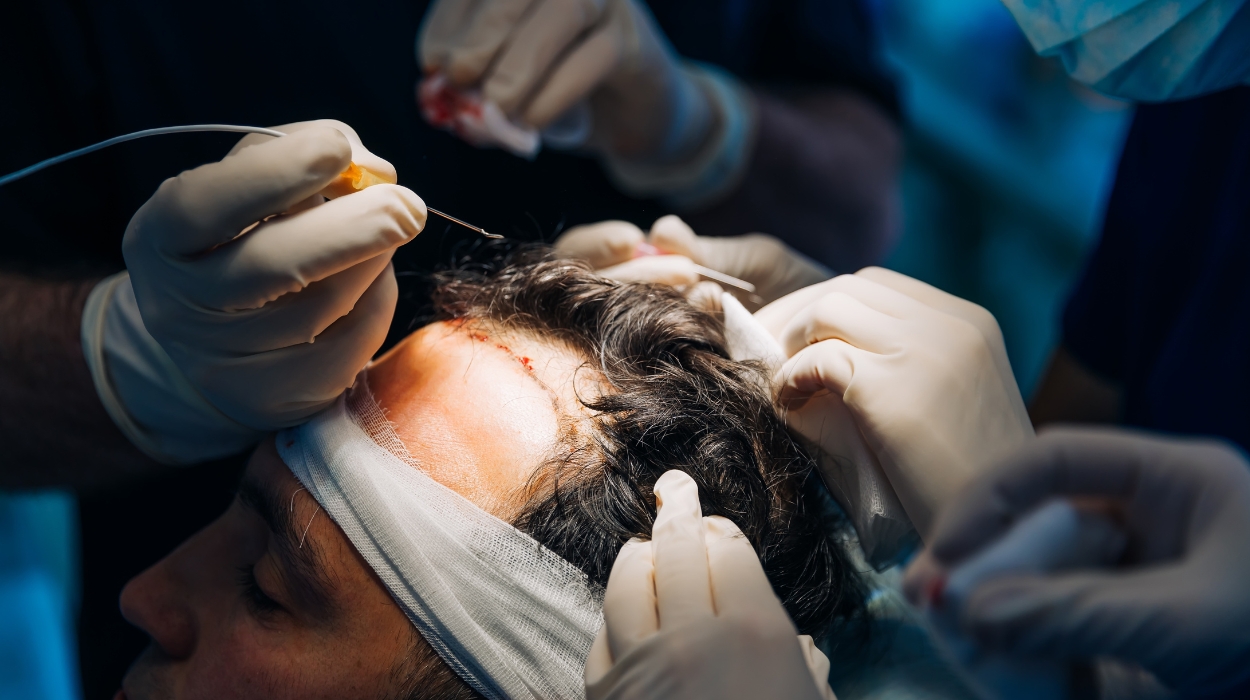 Expert's opinion
Expert's opinion
Expert's opinion
The article is a subjective view on this topic written by writers specializing in medical writing.
It may reflect on a personal journey surrounding struggles with an illness or medical condition, involve product comparisons, diet considerations, or other health-related opinions.
Although the view is entirely that of the writer, it is based on academic experiences and scientific research they have conducted; it is fact-checked by a team of degreed medical experts, and validated by sources attached to the article.
The numbers in parenthesis (1,2,3) will take you to clickable links to related scientific papers.
Does Testosterone Cause Hair Loss? This Is The Answer In 2024

Hair loss is a common concern for men, with many wondering about the role testosterone plays. Does testosterone make hair grow? Or does too much testosterone cause hair loss? And what exactly is testosterone, anyway?
Testosterone is a male sex hormone responsible for various functions in your body. There are many benefits of testosterone, including the development of male sexual characteristics, as well as regulating sex drive and fat distribution.
Testosterone itself isn’t exactly a factor in hair loss. Instead, the conversion of testosterone to dihydrotestosterone, known as DHT, is a more direct factor.
DHT is a byproduct of testosterone production and is considered a contributing factor to baldness[1].
So, does testosterone cause hair loss? No, not exactly. It’s DHT, a derivative of testosterone, that affects your hair follicles. Understanding this distinction can help you learn the cause of your hair loss and find the best treatments.
Can Testosterone Cause Hair Loss?
Can testosterone cause hair loss? No, testosterone itself doesn’t cause hair loss. However, it can indirectly play a role by increasing DHT levels. DHT is a derivative of testosterone that affects your hair follicles. However, other factors, such as genetics and age, also play a part.
Does Testosterone Cause Hair Loss?
Does High Testosterone Cause Hair Loss?
High levels of testosterone can contribute to hair loss in some people. This is because when extra testosterone is converted into DHT, more hair follicles may shrink, leading to thinning hair.
Of course, not everyone with high testosterone levels will experience hair loss. It also depends on how much of your testosterone converts to DHT.
For women, elevated testosterone levels can also lead to hair loss, but it’s less common. This may be because they have lower levels of testosterone, to begin with.
Does Low Testosterone Cause Hair Loss?
Low testosterone levels can also contribute to hair loss and poor hair health. Low testosterone levels can lead to reduced hair growth and increased shedding.
Hair growth is dependent on a hormone balance, including a balance of testosterone levels.
Why Testosterone Causes Hair Loss?
The primary reason testosterone plays a role in hair loss is its conversion to DHT.[1] DHT binds to hair follicle receptors, causing them to shrink over time. This results in weaker, thinner hair strands that are more prone to shedding.
Genetics also play a significant role in determining how sensitive your hair follicles are to DHT. Some individuals may have a genetic predisposition. This makes them more susceptible to hair loss[2] when exposed to even normal levels of testosterone and DHT.
Does high (or low) testosterone cause hair loss in females?
While women have much less testosterone than men, even these lower levels can convert to DHT, too, triggering hair loss.
In summary, while testosterone may contribute to hair growth on your face and body, it can also lead to hair loss on your scalp when converted to DHT. To maintain a healthy balance, keep your testosterone levels in check through proper diet, exercise, and, if necessary, medical intervention.
What Is Testosterone?
Testosterone is a hormone produced by your body, and it’s mostly found in the testicles of men and in smaller amounts in women’s ovaries. It works to develop male characteristics, such as hair growth, muscle mass, and a deepening voice during puberty.
Testosterone also contributes to your overall well-being and mental health,[3] including your mood, libido, and energy levels.
In men, testosterone production peaks during adolescence and begins to decline gradually after the age of 30. Low testosterone levels may lead to symptoms like fatigue, reduced sex drive, and mood changes. However, other factors can also cause these symptoms, such as stress.
In women, testosterone is produced in smaller amounts and plays a role in maintaining a healthy sex drive,[4] bone and muscle mass, and mood.
Understanding the role of testosterone in your body can help you be more aware of any potential health concerns related to hormone levels. Be sure to consult with a health professional before seeking treatments or making significant lifestyle changes.
How Testosterone Impacts Your Hair
When it comes to your hair, testosterone can have both positive and negative effects. In this section, we’ll explore the link between testosterone and hair loss and answer the question: does testosterone (or taking testosterone) cause hair loss?
Testosterone can promote hair growth[1] on your face and body because it helps stimulate the production of new hair follicles.
Increased testosterone levels can lead to thicker facial hair and more body hair growth. It converts to DHT, allowing the body to regulate and fine-tune its effects. But, this conversion can also lead to hair loss.
Other Common Causes Of Hair Loss
Aside from the link between testosterone and hair loss, these factors may contribute to hair thinning or balding in the hair growth cycle:
Stress
Increased stress levels can lead to a type of hair loss called telogen effluvium.[5] In this condition, significant stress pushes your hair follicles into a resting phase, resulting in excessive shedding. Managing your stress levels through relaxation techniques, regular exercise, and a healthy diet can help hair to grow back again.
Nutritional Deficiencies
Lack of essential nutrients like iron, zinc, and specific vitamins can also contribute to hair loss.[6] Ensure you maintain a balanced diet and consider using supplements if you’re deficient in any vitamins or minerals to support healthy hair growth.
Hormonal Imbalances
Hormonal changes, particularly in women, can lead to hair loss. This may occur during pregnancy, menopause, or due to thyroid problems. Speak to your doctor if you suspect a hormonal imbalance so they can help you determine the cause and appropriate treatments, such as hormone therapy.
Medical Conditions
Some medical conditions, like alopecia areata,[7] prostate cancer, and scalp infections, can directly cause hair loss. If you notice unusual hair loss patterns or pain in your scalp, consult your healthcare professional for an accurate diagnosis and treatment plan — which may include testosterone replacement therapy.
Remember, several factors can contribute to hair loss. By addressing these issues and maintaining a healthy lifestyle, you can better manage the health of your hair.
How To Manage Hair Loss Caused By Testosterone
If you’re experiencing hair loss due to testosterone, there are several steps you can take to manage and potentially stop hair loss.
Balanced Diet And Exercise

Maintaining a healthy diet and engaging in regular exercise can help regulate hormone levels, including testosterone. Incorporating nutrients such as biotin, zinc, and vitamin D can promote hair growth and overall health.
Topical Treatments
Topical treatments like minoxidil[8] can help slow hair loss and promote regrowth. Apply these treatments according to the product’s instructions, and consult a healthcare professional for personalized advice.
Oral Medications
Oral medications, like Finasteride, can help manage hair loss caused by testosterone. This medication works by blocking the conversion of testosterone to DHT, the culprit responsible for hair loss.
Hair Transplants

Sometimes, hair transplants are a good option to treat testosterone hair loss. An area of the scalp with thinning hair is transplanted with healthy hair follicles from another area.
Remember, consult a healthcare professional before starting any treatments for hair loss. They can provide personalized advice and discuss the most suitable options based on your specific circumstances.
The Bottom Line
To understand the link between testosterone and male pattern hair loss, it’s essential to understand how DHT, a derivative of testosterone, works. DHT can shrink hair follicles and limit hair growth at high levels.
Your genes also play a significant role in whether or not you experience hair loss due to testosterone. If you’re genetically predisposed to being sensitive to DHT, the likelihood of experiencing hair loss increases.
It’s important to note that not everyone with high testosterone levels will experience hair loss. Factors such as hormonal balance, stress, and overall health also contribute to your risk of hair loss.
Always seek professional advice if you’re worried about hair loss. A medical professional can evaluate the cause and recommend appropriate treatments or lifestyle changes to help manage the issue.
+ 8 sources
Health Canal avoids using tertiary references. We have strict sourcing guidelines and rely on peer-reviewed studies, academic researches from medical associations and institutions. To ensure the accuracy of articles in Health Canal, you can read more about the editorial process here
- Izabela Urysiak-Czubatka, Kmiec, M. and Grażyna Broniarczyk-Dyła (2014). Assessment of the usefulness of dihydrotestosterone in the diagnostics of patients with androgenetic alopecia. [online] 4, pp.207–215. doi:https://doi.org/10.5114/pdia.2014.40925.
- Emin Tuncay Ustuner (2013). Cause of Androgenic Alopecia. [online] 1(7), pp.e64–e64. doi:https://doi.org/10.1097/gox.0000000000000005.
- Straftis, A.A. and Gray, P.H. (2019). Sex, Energy, Well-Being and Low Testosterone: An Exploratory Survey of U.S. Men’s Experiences on Prescription Testosterone. [online] 16(18), pp.3261–3261. doi:https://doi.org/10.3390/ijerph16183261.
- Davis, S.R. and Wahlin-Jacobsen, S. (2015). Testosterone in women—the clinical significance. [online] 3(12), pp.980–992. doi:https://doi.org/10.1016/s2213-8587(15)00284-3.
- Shashikant Malkud (2015). Telogen Effluvium: A Review. [online] doi:https://doi.org/10.7860/jcdr/2015/15219.6492.
- Almohanna, H.M., Ahmed, A., Tsatalis, J.P. and Tosti, A. (2019). The Role of Vitamins and Minerals in Hair Loss: A Review. [online] 9(1), pp.51–70. doi:https://doi.org/10.1007/s13555-018-0278-6.
- NIAMS (2017). Alopecia Areata. [online] National Institute of Arthritis and Musculoskeletal and Skin Diseases. Available at: https://www.niams.nih.gov/health-topics/alopecia-areata
- Poonkiat Suchonwanit, Sasima Thammarucha and Kanchana Leerunyakul (2019). Minoxidil and its use in hair disorders: a review. [online] Volume 13, pp.2777–2786. doi:https://doi.org/10.2147/dddt.s214907.



